Young Adult Caucus seeks deadline extension on House of Deputies leadership elections
by dpaulsen |[Episcopal News Service] The House of Deputies’ Young Adult Caucus has called on the secretary of General Convention to extend the application deadline for deputies interested in running for president or vice president, though with the 81st General Convention less than two months away, the window for new applications appears to have closed.
The request was sent to the Rev. Michael Barlowe, the General Convention secretary, in the final hours before the April 24 deadline and posted to the Young Adult Caucus’ website. It followed an April 21 announcement by the Rev. Rachel Taber-Hamilton, the current House of Deputies vice president, that she intended to challenge House of Deputies President Julia Ayala Harris in the president election.
“This deadline extension will allow for meaningful discernment amongst deputies considering service as the president or vice president of the House of Deputies,” the caucus’ leaders said. And because Episcopal Church Canons require the president and vice president to be from different orders, clergy and lay, “we must ensure a robust slate of candidates of both orders is available to fill the vice presidential role.”
Barlowe, in his written response to the caucus, said he had previously extended the deadline from Feb. 21 to April 24 because he shared the caucus’ “desire for a broad discernment for leadership.” He is unable to extend the deadline further, however, because the Joint Rules of Order require submissions at least 60 days before General Convention to allow enough time to conduct background checks.
“It may be possible, at General Convention, for a motion to be made to set aside the Joint Rule, and so allow nominations of persons whose background checks were requested after the deadline required by the rule,” Barlowe added in his response, which was provided to Episcopal News Service.
No other deputies have yet declared candidacies for president or vice president, though more could come forward in the coming weeks, if they applied by the April 24 deadline.
Barlowe outlined the elections process earlier this year in a message to deputies. In it, he indicated that anyone who submitted to a background check must declare as a candidate for president by June 24 or vice president by June 27, the second and fifth legislative days of the 81st General Convention in Louisville, Kentucky. The presidential election is set for June 26 and the vice presidential election for June 28.
– David Paulsen is a senior reporter and editor for Episcopal News Service based in Wisconsin. He can be reached at dpaulsen@episcopalchurch.org.
Church of England announces proposed financial awards for victims of church-related abuse
by mwoerman |[The Church of England] Details of the proposed financial award framework for the Church of England’s national Redress Scheme for survivors and victims of church-related abuse have been published.
If approved through the Church of England’s legislative processes, the framework would result in individual awards of between about $6,200 and more than $825,000 in rare and exceptional circumstances.
The Redress Project Board recommendation follows many months of detailed conversations and consultation with survivors of church-related abuse. Financial awards would be calculated by taking into account factors such as the nature of the abuse and its impact on the applicant. In addition to individual financial awards, the Redress Scheme will offer eligible applicants other forms of redress, such as emotional and therapeutic support, and apology.
The chair of the Redress Project Board, the Rt. Rev. Philip Mounstephen, said, “The recommended financial awards framework, developed with guidance and input from survivors and external experts, aims to address the range of suffering experienced, offering financial redress in a clear and transparent manner. No amount of money can ever undo the past. Our hope, nonetheless, is that this could be a significant step both towards the acknowledgment of wrongdoing, and, however incompletely, towards helping rebuild lives.”
Read the entire article here.
In solidarity visit to Sudan, WCC strengthens foundations for peace
by mwoerman |[World Council of Churches] The World Council of Churches led a delegation that visited Sudan April 18-22. In addition to the WCC, the ecumenical group included All Africa Conference of Churches, ACT Alliance, Association of Member Episcopal Conferences in Eastern Africa Global Ministries, Fellowship of Christian Councils and Churches in the Great Lakes and Horn of Africa, General Board Global Ministries of the United Methodist Church, and Norwegian Church Aid.
The goal of the visit was to express solidarity and provide spiritual and pastoral accompaniment to the churches and people of Sudan following a one-year war. The ecumenical delegation was led by WCC general secretary the Rev. Jerry Pillay and WCC president from Africa His Holiness the Most Rev. Rufus Okikiola Ositelu, of the Church of the Lord (Prayer Fellowship) Worldwide, who preached on April 21 in the Cathedral of Christ Province of the Episcopal Church of Sudan.
“The solidarity visit to Port Sudan was informative, enlightening, alarming and shocking,” Pillay said. “We engaged in conversations with church leaders, women, youth, the president, vice-president, other government officials, other religious leaders and different groups of people.”
Read the entire article here.
Historic St. Thomas Choir School, Chapel Royal choristers sing together for first time
by skorkzan |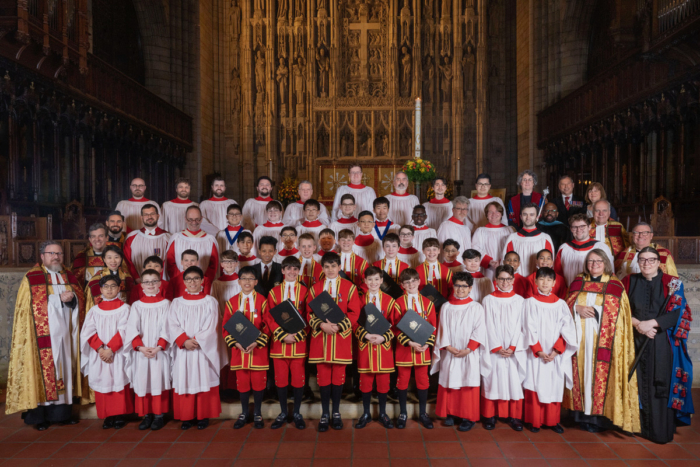
For the first time since its establishment in 1135, the Children of His Majesty’s Chapel Royal, based at St. James’s Palace in London, England, made its inaugural visit to the United States in 2024. While there, the Chapel Royal choristers joined the St. Thomas Choir School choristers in New York City for special performances on April 19 and 21. Photo: Scott Heins
[Episcopal News Service] The Children of His Majesty’s Chapel Royal, based at St. James’s Palace in London, England, made its inaugural visit to the United States last week.
“We share the same sort of musical tradition with the choristers of the Chapel Royal,” the Rev. Carl Turner, rector of St. Thomas Church on Fifth Avenue in Midtown Manhattan, told Episcopal News Service. “We’re celebrating our links with Britain and the Royal Family, but also we’re celebrating our common tradition of music and liturgy.”
When the Chapel Royal choristers weren’t visiting popular New York City tourist destinations, they were rehearsing with the St. Thomas Choir School choristers in preparation for special performances on April 19 and 21.
St. Thomas Church houses the St. Thomas Choir School, which is one of only three all-boys boarding schools in the world that exclusively educate treble choristers. The other two schools are the Escolania de Montserrat in Spain and the Westminster Abbey Choir School in England. St. Thomas Choir School was founded in 1919. Today, 28 students from across the United States in third through eighth grades are enrolled at the school, which has 15 faculty and staff members. The students sing five worship services each week and perform around the world.
“[These boys] learn early on about teamwork and commitment and dedication and giving back, and that’s the hallmark of the life of a chorister,” Turner said.
Established in 1135, the Chapel Royal choir is one of the oldest extant musical organizations in the world. Today, the choir consists of 12 boy choristers who sing regular services at the Chapel Royal. They also perform wherever and whenever requested by the reigning monarch. In May 2023, the choristers sang at King Charles III’s coronation. Samuel Strachan, Chapel Royal’s longest-serving chorister, greeted the king at the start of the coronation. Notable Chapel Royal alumni include Baroque composers George Frideric Handel and Henry Purcell.
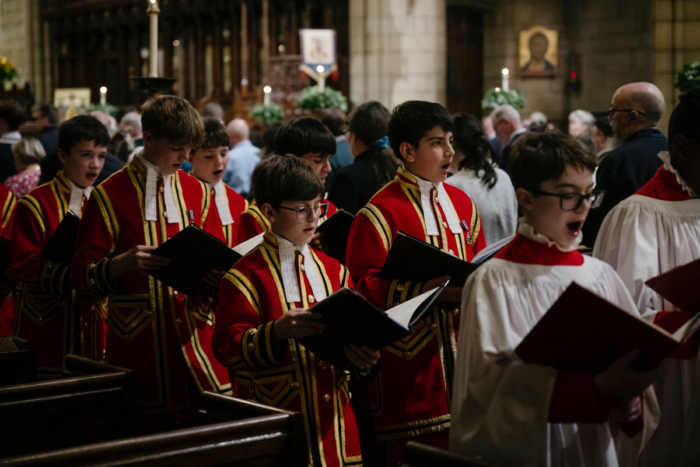
For the first time since its establishment in 1135, the Children of His Majesty’s Chapel Royal, based at St. James’s Palace in London, England, made its inaugural visit to the United States in 2024. While there, the Chapel Royal choristers joined the St. Thomas Choir School choristers in New York City for special performances on April 19 and 21. Photo: Scott Heins
The Chapel Royal choristers are also known for their distinctive uniform of red and gold cassocks and surplices dating back to the British monarchy’s 1660 restoration.
The April 19 Evensong performance included choral music by Philip Moore, Charles Callahan and Edward Bairstow. The choirs also sang on April 21 in the morning during the solemn Eucharist and later in the afternoon during the Festal Evensong. Choral music performed during the Festal Evensong included works by Arthur Li, Philip Moore, Herbert Howells and George Frideric Handel. The Gentlemen of the St. Thomas Choir of Men and Boys, St. Thomas Church’s professional men’s choir, sang with the St. Thomas Choir School and Chapel Royal choristers during all three performances. Altogether, 40 men and boys performed on the 19th and 21st. All performances were livestreamed on St. Thomas Church’s YouTube channel.
The special collaboration with the Chapel Royal choir took place one month after St. Thomas Church announced that its Choir School is in danger of closing as early as 2025. St. Thomas said in the announcement that its investment practice over the century has become “unsustainable,” and the unrestricted general endowment fund to balance the budget has been “depleted.” However, Turner said the Royal Family funded the Chapel Royal choir’s visit to the United States, so “it’s not been a financial burden.”
Turner said the announcement was made before the situation became a “crisis” and to ensure transparency. All current choristers are re-enrolled for the 2024-2025 school year, but the church’s vestry plans to decide by October whether to keep the school open beyond 2025.
“It is very expensive, and we are overdrawing from our reserves. If nothing changes, it will run out,” Turner said. “It’s our fiduciary responsibility to say we have to either find new revenue streams and also increase the endowment, or we have to change the model in some way whilst trying to preserve the most unique choral tradition in the whole of North America.”
The $4 million annual operating cost is 29% of St. Thomas Church’s $14 million budget. Most of the church’s $138 million endowment is restricted for uses that can’t be spent on the school. Tuition is $20,570 per year, but most students receive financial aid averaging $15,303. The average tuition cost for a boarding school in New York state is $70,228 per year.
Midtown Manhattan is one of the most expensive neighborhoods in New York City, which is one of the most expensive cities in the world to live in. Because of this, Turner said he thinks many people assume that St. Thomas is one of the richest churches in North America, “but we’re actually not. We’re asset rich but cash poor.”
Despite the financial concerns, Turner said the St. Thomas Church and choir school community have much reason to celebrate. For one thing, the church celebrated its bicentennial in October 2023. The choir school celebrated its centennial in 2019.
Additionally, “our connection with the Chapel Royal is strong and we wanted both sets of boys to sing together and strengthen those ties as bonds of affection across the Anglican Communion, the Church of England and The Episcopal Church, and also to raise awareness of our own choral tradition here in New York,” Turner said.
“At a time of heightened tension in the world, every morning when you listen to the news, you wonder what else is going to be happening. Here are children who are not just performing; they’re teaching us how to worship and they’re teaching us how to live in the Beloved Community, and I think that is priceless.”
-Shireen Korkzan is a reporter and assistant editor for Episcopal News Service based in northern Indiana. She can be reached at skorkzan@episcopalchurch.org.
Episcopal Church announces hiring of its first gender justice staff officer
by dpaulsen |[Episcopal News Service] The Episcopal Church has hired a faith-based organizer from the Diocese of Olympia to be the church’s first gender justice staff officer, ending a nearly two-year process that originated in a 2022 resolution approved by the 80th General Convention.
Aaron Scott, who has nearly two decades of experience as an organizer from the transgender community, will begin work as the gender justice staff officer on April 29, according to a church news release. In this new role, Scott “will seek to inspire, gather and equip Episcopalians for justice, advocacy, and inclusion work focused on women and LGBTQ+ people,” the release says. He will develop formation opportunities, share related resources with the wider church and help expand a network of leaders focused on greater inclusion of people of all gender identities and expressions.
Scott was selected from a list of finalists interviewed by an 11-member gender justice committee that helped develop the new position with the Rev. Melanie Mullen, the church’s director of reconciliation, justice, and creation care. “Aaron impressed the committee with his theological and community-organizing knowledge,” Mullen said in the news release. “There is great urgency to protect members of the LGBTQ+ community, and we look forward to the impact Aaron’s work will have on the church and beyond.”
The 80th General Convention, at its July 2022 meeting in Baltimore, Maryland, authorized the creation of the position in Resolution A063, which was proposed by the Task Force to Study Sexism in the Episcopal Church and Develop Anti-Sexism Training. During deliberations on the resolution, its focus widened from anti-sexism training to include both women’s ministries and LGBTQ+ inclusion.
The process of developing and filling that new position, however, was not immediate, and church leaders have faced questions over the past two years over the pace of progress toward fulfilling the resolution’s mandate.
In February 2023, the church announced in a news release it was recruiting volunteers to the gender justice committee “to help cast vision and interview candidates” for the position. Two months later, church budget planners heard concerns that the gender justice position had not yet been filled, during testimony at an April 2023 listening session on the 2025-27 churchwide budget. “It’s ever more important … that this position exists,” Sarah Lawton testified at the time.
Lawton, a lay leader from the Diocese of California who serves on the steering committee of TransEpiscopal, would later be among the 11 people named to the gender justice committee’s roster, which was announced in an October 2023 news release that included a call for applications for the new staff officer position.
Scott began his gender justice work in 2006 with Queers for Economic Justice. In 2013, he co-founded Chaplains on the Harbor with the Rev. Sarah Monroe as a group of Episcopal chaplains ministering to homeless individuals in the coastal communities of Grays Harbor County, Washington.
More recently, Scott has worked at Union Theological Seminary’s Kairos Center as project coordinator for the Countering White Christian Nationalism Initiative, and he serves on the national steering committee for the Poor People’s Campaign. Scott has a master’s degree in in biblical studies from Union Theological Seminary and a bachelor’s degree from Fordham University’s Latin American and Latino Studies Institute.
Navajoland seeks to become missionary diocese in resolution proposed to 81st General Convention
by dpaulsen |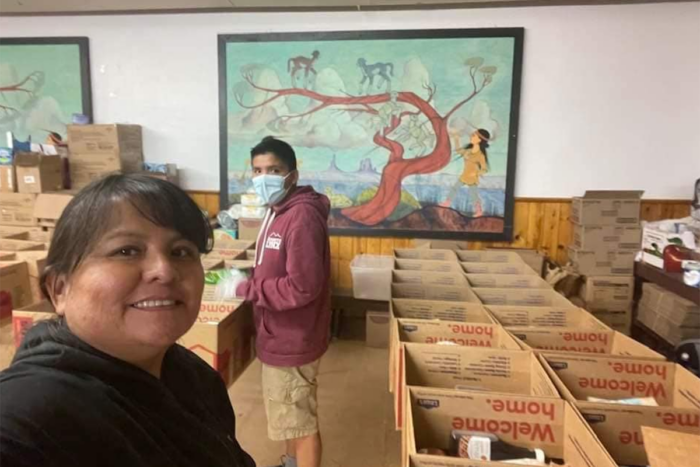
Volunteers at Good Shepherd Mission in Fort Defiance, Arizona, fill boxes of food for delivery to Navajo Nation residents as part of a feeding ministry of the Episcopal Church in Navajoland in November 2021. Photo: Leon Sampson
[Episcopal News Service] Navajo Episcopalians are asking The Episcopal Church to elevate their area mission, known as Navajoland, to the status of a missionary diocese – a step that, if approved in June by the 81st General Convention, would enable Navajoland to elect its own bishop while continuing to receive financial support from the wider church.
The change is proposed by Resolution C009, which was endorsed and submitted by a special convocation held in January by the Episcopal Church in Navajoland. Episcopal leaders there worked on the plan with the church’s Standing Commission on Structure, Governance, Constitution and Canons. Their work followed a previous resolution, approved in 2022 by the 80th General Convention, entrusting Navajoland “to establish its own rules and procedures for a process of discernment for the calling of a bishop that reflects the values, teachings, and traditions of the Diné.”
In Navajoland, “we have a church that is growing,” the Rev. Cornelia Eaton, the area mission’s canon to the ordinary, told Episcopal News Service. Eaton is one of five ordained Navajo clergy now actively serving Navajo Nation communities, and in recent years, they and other church members have expanded Navajoland’s ministries that serve local residents and bolster the mission’s financial sustainability, from starting a beekeeping operation to the opening of the Hozho Wellness Center.
As an area mission, however, Navajoland’s bishop is appointed by the House of Bishops. At the January convocation, “there was a lot of energy around people wanting to become a missionary diocese. … A lot of the elders spoke up in support,” Eaton told ENS. “It gives us the autonomy to select or have an election for a bishop.”
The Navajo people have their own ways of raising up leadership, Eaton added, “a Navajo traditional cultural way of doing that.”
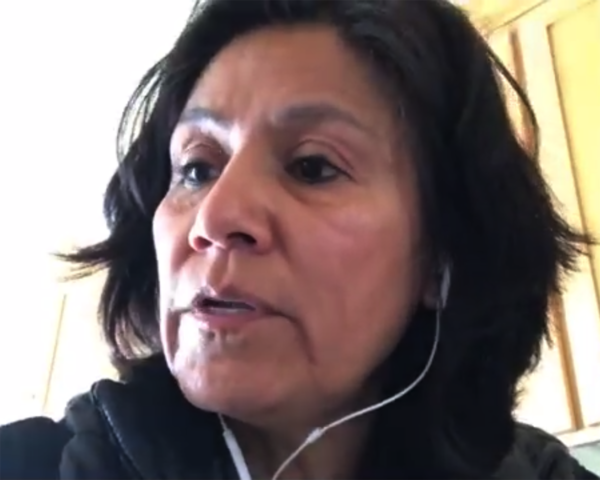
The Rev. Cornelia Eaton, canon to the ordinary for the Episcopal Church in Navajoland, participates in an April 2020 meeting on Zoom with other Episcopal clergy and lay leaders serving indigenous communities.
She and other Navajoland leaders are expected to testify in favor of the resolution at a hearing at 8 p.m. Eastern April 30 on Zoom, hosted by General Convention’s Governance & Structure committees. Anyone interested in observing or testifying at the hearing is asked to register in advance.
The Episcopal Church’s ministry on the 27,000-square-mile Navajo reservation dates back more than a century to medical missions established in Fort Defiance, Arizona; Farmington, New Mexico; and Bluff, Utah. In 1978, the Episcopal Church carved out sections of the dioceses of Rio Grande, Arizona and Utah to create the Navajoland Area Mission.
After the 2022 resolution by General Convention encouraging Navajoland to develop a process for calling its own bishop, the Standing Commission on Structure, Governance, Constitution and Canons created a subcommittee to work with Navajoland on the details. The Rev. Rachel Taber-Hamilton, the House of Deputies vice president, chaired the subcommittee.
Taber-Hamilton, who is Shackan First Nation and serves as a priest in the Diocese of Olympia, told ENS that the church is striking the right balance by supporting Navajoland without dictating where that support will lead. “It really feels like we’re moving away from a patriarchal model to one that’s genuinely empowering,” Taber-Hamilton told ENS.
Under Title I, Canon 11 of The Episcopal Church Canons, area missions and missionary dioceses both “constitute jurisdictions for which this church as a whole assumes a special responsibility.”
In an area mission, the House of Bishops assigns one of its own to “exercise jurisdiction as a missionary bishop” on matters of governance, ministry and worship. The Rt. Rev. Barry Beisner, formerly bishop of Northern California, has served Navajoland in that capacity since May 2023, succeeding Bishop David Bailey.
Unlike an area mission, a missionary diocese is empowered to adopt its own constitution and canons, in compliance with The Episcopal Church Constitution and Canons, while also holding an annual diocesan convention and electing a bishop, standing committee, and clergy and lay deputations to General Convention.
“The convention of a missionary diocese shall also adopt an annual budget and program for the diocese, and provide for the means of its administration throughout the year,” the canon says, “and shall make provision for the review and approval of requests for grants in aid from the Executive Council or other sources of funds, both toward current operations and for capital needs.”
In the explanatory text accompanying Navajoland’s request to become a missionary diocese, it notes that the area mission “was already operating very much like a missionary diocese.” Navajoland leaders, though, raised concerns about maintaining financial assistance in the churchwide budget.
“Parishioners give what they can to their churches but their monetary contributions are not sufficient to sustain a budget that must pay salaries and provide benefits for staff, pay utilities and maintenance for buildings and much more,” Eaton wrote in narrative budget document attached to the resolution. “The Episcopal Church has provided grants to [Navajoland] but even those grants have not been enough to cover all budget items.”
Navajoland chose to move forward with its push to become a missionary diocese, Eaton wrote, with the hope that it will continue to receive financial backing from The Episcopal Church.
The proposed 2025-27 churchwide budget plan includes $800,000 over three years for a bishop serving Navajoland and an additional three-year block grant of nearly $1.5 million to support Navajoland’s congregations and ministries.
Separately, the 81st General Convention will consider three resolutions aiming to address inequities in the church’s denominational health plans, some of which were discovered when Navajoland employees testified that they had effectively opted out of the plans because of the cost.
Executive Council approved $150,000 in emergency relief to cover Navajoland’s health insurance premiums for 2024. The proposals to the 81st General Convention aim to ensure that coverage will continue.
– David Paulsen is a senior reporter and editor for Episcopal News Service based in Wisconsin. He can be reached at dpaulsen@episcopalchurch.org.
2024 Anglican Communion primates’ meeting will take place in Rome April 29-May 3
by mwoerman |[Anglican Communion News Service] Senior archbishops, presiding bishops and moderators of the churches of the Anglican Communion will meet in Rome for the 2024 Primates’ Meeting April 29-May 3. Conceived as a pilgrimage, they will pray and study Scripture together, visit holy sites in Rome, and reflect together about the mission and witness of the church in the world.
In the first gathering of Anglican Primates to be held in Rome, the Primates’ program will include a meeting with Pope Francis and conversation with Cardinal Mario Grech about the meaning and promise of synodality for the whole church.
The primates will be hosted by the Most Rev. Ian Ernest, the director of the Anglican Centre in Rome. The primates were due to meet in Rome in 2020, but the meeting was postponed due to the COVID-19 pandemic.
It will be the first Primates’ Meeting for seven of the primates.
Since its establishment in 1978 by then-Archbishop of Canterbury Donald Coggan, the Primates’ Meeting has coordinated closely with both the Anglican Consultative Council and the Lambeth Conference.
The Primates’ Meeting is one of the “instruments” of the Anglican Communion that work for unity among Anglican churches globally. The other instruments are the Anglican Consultative Council, the Lambeth Conference and the Archbishop of Canterbury.
The city of Rome is full of historical and spiritual significance for the whole Christian world. Pope Gregory the Great sent Augustine of Canterbury on a mission to England in 597. Especially since the Second Vatican Council (1962-1965), Rome has been a center of inter-Christian encounter and ecumenical research.
In and around their meeting, the primates will undertake a pilgrimage in the city, visiting both St. Peter’s Basilica and the Basilica of Saint Paul Outside the Walls (where St. Paul the Apostle is buried), in addition to visits to Tre Fontane, Santa Maria in Trastevere, and the Community of Sant’Egidio.
The Primates’ Meeting agenda is developed by the regional primates of the Anglican Communion who serve on the Primates’ Standing Committee. The agenda will be finalized by common consent at the start of the meeting. Topics will include prayerful conversation about areas of conflict in the world and regional meetings to discuss issues of local concern.
The primates also will be asked to engage with and respond to a paper by the Inter-Anglican Standing Commission on Unity, Faith and Order (IASCUFO), commissioned by the Anglican Consultative Council in 2023. The paper looks at structure and decision-making in the Anglican Communion and offers proposals to help address difference and disagreement in the Anglican Communion. IASCUFO reports to all four Instruments of the Anglican Communion and will carry its paper to the next meeting of the ACC in 2026.
Speaking about the 2024 Primates’ Meeting, the Most Rev. Justin Welby, archbishop of Canterbury, said, “The Primates’ Meeting is an important time of pilgrimage and fellowship. Together, we will discuss common priorities and challenges in the global mission and shared life of the Anglican Communion. The primates serve churches and communities around the world. Many come from settings where people are directly impacted by the instability of conflict, the challenge of climate crisis and the injustice of poverty. Together, we will pray for the needs of people and planet, the unity of God’s church and the witness of the Anglican Communion.”
The Most Rev. Ian Ernest of the Anglican Centre in Rome, said, “The Anglican Centre in Rome seeks to be a living reality of the Communion’s commitment to church unity, working collaboratively with all Christians for justice and peace in the world. We are looking forward to welcoming Anglican primates to the center for prayer, pilgrimage and conversation.”
The Rt. Rev. Anthony Poggo, secretary general of the Anglican Communion said, “At the Anglican Communion Office, we pray for all the primates of the Anglican Communion. We give thanks for the collaboration of the Anglican Centre in Rome and our sisters and brothers at the Vatican, who have worked so hard to support this important meeting.”
As secretariat to the Anglican Communion, staff from the Anglican Communion Office in London will support the Primates’ Meeting.
Episcopal Parish Network’s Earth Day webinar highlights climate advocacy barriers, responsible investing
by skorkzan |
Kendra Haven is director of special projects at InfluenceMap, an independent data analysis think tank that tracks companies and industry associations. During the Episcopal Parish Network’s Earth Day 2024 webinar, Haven addressed how multinational oil and gas corporations spend hundreds of millions of dollars annually to shape public image by appearing in favor of reducing emissions. However, claims of “going green” are inconsistent with the companies’ policy engagement. Photo: Screenshot
[Episcopal News Service] On April 22, the Episcopal Parish Network hosted a virtual conversation about corporations impeding climate advocacy progress in observance of Earth Day. The webinar was one of many Earth Day events Episcopal congregations and ministries hosted this year.
“As we celebrate Earth Day today, one way that we can honor God and our faith tenents is by caring for God’s creation,” said JoAnn Hanson, president and chief executive officer of the Church Investment Group, a nonprofit that offers ethical investing resources to Episcopal entities managing endowments.
The Episcopal Parish Network is a national, membership-based organization of clergy and lay leaders representing 200 parishes of all sizes and budgets across the church. The webinar featured two speakers – Kendra Haven, director of special projects, and Cleo Rank, a senior policy analyst – affiliated with InfluenceMap, an independent data analysis think tank that tracks companies and industry associations. The two speakers and Hanson shared how partisan advocates and fossil fuel companies and interest groups direct resources to hinder progress.
“When we look across our database, it’s the industry associations that across the globe in every jurisdiction really are the most powerful and the most negative on climate,” Haven said during the webinar.
Global dependence and investment in fossil fuels continue to dominate the energy sector over renewable sources. Haven pointed out that the industry associations with the most negative impact on climate tend to be concentrated in the United States and Canada, “which might speak to a little bit about why the U.S. has had a little bit more trouble passing ambitious climate policy unlike some countries in Europe.”
InfluenceMap listed the American Petroleum Institute as the most negative and influential industry association, according to a chart featured in the webinar. Another chart highlighted a 2022 analysis of Shell, BP, TotalEnergies, Chevron and ExxonMobil’s public communications showed that these multinational oil and gas corporations spend hundreds of millions of dollars annually to shape public image by appearing in favor of reducing emissions. However, claims of “going green” are inconsistent with the companies’ policy engagement.
“[Lobbying] is promoting narrative. It’s influencing public opinion. It’s appealing to voters as well as policymakers,” Haven said. “From there, it becomes easier for industry or industry interests to shape the climate policy agenda if they had sort of managed to lay that foundation of ‘gas is good,’ or whatever it is, and then get into the even more detailed work like specific budgets or regulations or standards.”
Rank addressed environmental, social and governance – more commonly known as ESG – investing, which is a set of issues and aspects that companies can use to demonstrate “responsible investing.” She also shared the current landscape of the anti-ESG movement, in which companies, organizations, individuals and stakeholders reject or criticize emphasizing ESG in favor of profits only.
“There’s definitely room for positive voices to step up and counter this,” Rank said.
Webinar participants were able to ask Haven and Rank questions using Zoom’s chat function. One participant inquired about greenwashing, a form of advertising and marketing that companies use to appear environmentally friendly but really aren’t. For example, ExxonMobil has advertised that its experimental algae biofuels can potentially reduce transport emissions. However, ExxonMobil has no company-wide net zero target.
“I recognize that these are not easy topics to discuss from the pulpit, particularly in jurisdictions where you’re trying to knit together disparate views,” Hanson said.
However, “all is not lost,” Rank said, highlighting anti-ESG legislation opposition from various groups, including state banking associations and state chambers of commerce. For example, the American Legislative Exchange Council rejected a proposed model anti-ESG bill in 2023.
Haven, Rank and Hanson also shared where participants can find economic literacy resources from InfluenceMap and the Church Investment Group’s websites.
Episcopalians can learn more about the church’s support for the environment and public health here.
-Shireen Korkzan is a reporter and assistant editor for Episcopal News Service based in northern Indiana. She can be reached at skorkzan@episcopalchurch.org.
Anglicans, Lutherans name 2024 Companion of Worship Arts recipients
by mwoerman |[Anglican Church of Canada] In the continuing spirit of full communion, the Anglican Church of Canada (ACC) and the Evangelical Lutheran Church in Canada (ELCIC) are pleased to announce the recipients of the 2024 Companion of the Worship Arts (CWA).
The CWA is awarded every three years in recognition of significant contributions to the worship life of both churches. Since 2014, one Anglican and one Lutheran recipient receive the honor, recognizing ongoing inspiration and encouragement to others, and service to God, through worship, spirituality and the arts.
This year’s Anglican recipient is the Ven. Richard Leggett. With an extensive record of academic publication in the fields of liturgics and ecumenical studies, Leggett has been committed to using his scholarship in the service of the church. This year’s Lutheran recipient is the Rev. Lyle McKenzie, who has served several congregations and also served for over 10 years as ELCIC’s assistant to the bishop for worship.
Read the entire article here.
World Council of Churches extends Passover greetings to Jewish people everywhere
by mwoerman |[World Council of Churches] On April 22, World Council of Churches general secretary the Rev. Jerry Pillay, on behalf of the global fellowship, extended greetings and wishes to Jewish people everywhere as they commemorate Passover.
“We join in prayer with all Jewish families and communities that gather to re-enact the rituals that keep the experience of the exodus alive in our hearts and minds,” said Pillay. “May the people forged by the memory of the years of bondage and wandering honor the God of liberation by their eagerness to do justice, to reconcile and unite humanity.”
Pillay expressed special appreciation for the conversations and collaboration with Jewish sisters and brothers towards securing peace and security in the Holy Land as anticipation of the incarnation of God’s liberating power today.
Read the entire article here.


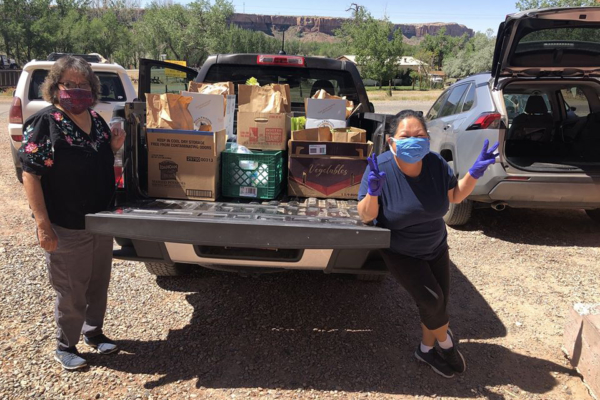
Social Menu